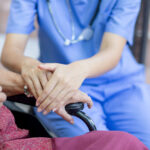Sacramento, California Memory Care Facility
It’s common to misinterpret agitation among the elderly. Daytime performance suffers when elderly people can’t get a good night’s sleep. Reduced quality of life, depression, anxiety, irritability, and agitation are all possible outcomes of sleep deprivation. So, what can Sacramento assisted living wellness facilities do to help ease older people’s restlessness, and what are some potential causes? The widespread sensorimotor sleep-related movement illness known as Restless Legs Syndrome (RLS), or Willis-Ekbom disease, is characterized by the compulsion to move one’s legs in response to uncomfortable feelings. A symptom of this condition is the strong desire to move one’s legs in an effort to alleviate the sensation of tingling or “bugs crawling” on or under the skin. Some affected individuals have likened the experience to having “electricity” surge through their legs. Some of the most common disorders affecting the elderly include dementia and RLS. Dementia patients who are unable to adequately describe their symptoms to their doctors may face diagnostic challenges. In order to avoid a misdiagnosis, it is important for caregivers to be familiar with symptoms.

What causes the symptoms of restless legs syndrome?
- Rubbing or kneading the legs.
- Grimacing or groaning while holding the legs.
- Excessive movement in the lower extremities such as kicking or rubbing the legs back and forth while in bed or in a reclining position.
- Excessive motor activity in the lower extremities, such as the need to walk or incessant pacing.
- Leg discomfort is more prevalent during periods of inactivity and seems better if the person is up and moving around.
- Symptoms get worse in the evening or at night.
In order to alleviate the painful feelings in their legs, people with RLS must constantly move their limbs. The agitation in the limbs is made worse by dementia, which might lead to the patient leaving the house at night or wandering improperly. You should take your family member to the doctor if you notice any of these symptoms so that he or she can get a proper diagnosis and, hopefully, treatment. Untreated restless legs syndrome (RLS) not only disrupts sleep but also makes it hard to accomplish things like sitting still for long periods of time (like driving, eating, watching TV, or lounging on a terrace during the summer). The lower limbs are typically the only ones affected by RLS. It’s possible for it to spread to other areas of the body, including the arms, neck, and trunk. When this occurs, it usually means the problem is getting worse. The restless legs syndrome (RLS) can be treated both medically and in other ways. Many people look to non-pharmaceutical methods before turning to prescription drugs.
- Massage the legs to relax the muscles.
- Soak in a warm tub.
- Apply warm or cool packs to the affected limbs.
- Avoid stimulants such as over-the-counter drugs (without checking with your doctor) and caffeine, nicotine, and alcohol.
- Establish an exercise routine.
- Use a foot wrap or vibrating pad.
- Try to develop a sleep routine and stick to it.
- Ask your physician to check for underlying conditions, such as iron deficiency, that might be causing the symptoms.
If you’re still feeling worse after trying these solutions, it’s time to see a doctor. Although there is currently no known cure for Restless Legs Syndrome, your doctor may recommend a treatment plan that includes rest, exercise, and the use of medications or supplements to alleviate symptoms.

Sacramento Assisted Living, Wellness at Jazba Care
Caffeine (particularly later in the day), tobacco, alcohol, and certain prescription and over-the-counter medicines are just a few prominent triggers. Medications such as dopamine blockers used to treat nausea, several types of antidepressants and antipsychotics, beta-blockers, and some older antihistamines (like Benadryl) are known to exacerbate RLS symptoms. Deprivation of sleep is yet another factor that can set off a devastating domino effect. When people with restless leg syndrome (RLS) have difficulties sleeping, they sometimes try over-the-counter sleep aids like melatonin, despite the fact that these medications can make RLS symptoms even worse. Contact us at Jazba Care, our experienced staff will ensure that all measures are taken if your loved one has RLS in Sacramento, CA.




